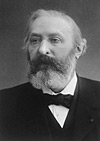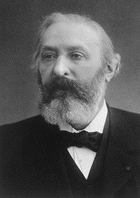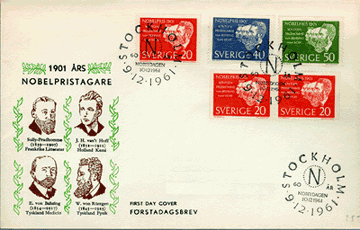|
|
|
The Nobel Prize in
Literature 1901

"in special recognition of his poetic composition, which
gives evidence of lofty idealism, artistic perfection and a rare combination
of the qualities of both heart and intellect"

Sully Prudhomme
(pen-name of René François Armand Prudhomme)
France
b. 1839
d. 1907
The Nobel Prize in Literature 1901
Presentation Speech by C.D. af Wirsén,
Permanent Secretary of the
Swedish Academy,
on December 10, 1901
When Alfred Nobel decided to make the
great donation which has justly received much attention, his entire life's
work led him to favour the study of nature and to reward discoveries in some
of the sciences concerned with it. Likewise, his cosmopolitan aspirations
made him an advocate of peace and of the brotherhood of nations. In his will
he also included literature, although he placed it after the sciences, to
which he felt most drawn.
Literature is grateful to him that its practitioners have also been the
object of his solicitude; one could argue that it comes last in the group of
Swedish prizes for the very sound reason that the supreme flower of
civilization, perhaps most beautiful yet also most delicate, will now bloom
on the firm ground of reality.
In any event, the laureates receive in these floral tributes of modern times
a recompense surpassing in material value the golden violets of a past era.
The award of the Nobel Prize in Literature poses its own problems.
«Literature» is a very inclusive term and the statutes of the Nobel
Foundation rightly specify that the competition must include not only
belles-lettres but also works which, by their form as well as by their
exposition, have literary value. But thereby the field is expanded and the
difficulties are compounded. If it is difficult to decide - supposing that
the merits of the proposed authors otherwise are approximately equal -
whether the Prize should be granted to a lyric, an epic, or a dramatic poet,
the task is complicated even more if it becomes a matter of choosing among
an eminent historian, a great philosopher, and a poet of genius. The
dimensions become, as the mathematicians say, incommensurable. But one may
be consoled with the thought that, since the Prize is an annual one, more
than one writer of merit who has to yield his place to another equally
great, may be able to receive some other year the award he deserves.
Numerous and excellent recommendations for the literary Prize have reached
the Swedish Academy. It has submitted them to the most scrupulous
examination and in its choice among different names of universal reputation
and almost equal literary importance, it has decided on one which it
believed should have priority this time from several points of view. It has
awarded the first Nobel Prize in Literature to the poet and philosopher
Sully Prudhomme of the French Academy.
Sully Prudhomme was born March 16, 1839, and in 1865 emerged as an
accomplished poet in his Stances et Poèmes [Stanzas and Poems]. This
volume was followed by several others of verse, philosophy, and aesthetics.
If the imagination of other poets is primarily turned outward and reflects
the life and the world surrounding us, Sully Prudhomme has an introvert
nature as sensitive as it is delicate. His poetry is rarely concerned with
images and exterior situations as such, but principally with the extent to
which they can serve as a mirror of poetic contemplation. The love of the
spiritual, his doubts, his sorrows, which nothing earthly can dissipate, are
the usual subjects of his work which, in its finished form and sculptural
beauty, suffers no useless word. His poetry appears in exuberant colours and
only rarely takes on the character of melodious music; but it is all the
more plastic in the creation of forms suited to expressing feelings and
ideas. Noble, profoundly pensive, and turned toward sadness, his soul
reveals itself in this poetry, tender yet not sentimental - a sorrowful
analysis which inspires a melancholy sympathy in the reader.
Through the charm of his exquisite diction and through his consummate art,
Sully Prudhomme is one of the major poets of our time, and some of his poems
are pearls of imperishable value. The Swedish Academy has been less
attracted by his didactic or abstract poems than by his smaller lyric
compositions, which are full of feeling and contemplation, and which charm
by their nobility and dignity and by the extremely rare union of delicate
reflection and rich sentiment.
In conclusion, it is necessary to emphasize one characteristic. Sully
Prudhomme's work reveals an inquiring and observing mind which finds no rest
in what passes and which, as it seems impossible to him to know more, finds
evidence of man's supernatural destiny in the moral realm, in the voice of
conscience, and in the lofty and undeniable prescriptions of duty. From this
point of view, Sully Prudhomme represents better than most writers what the
testator called «an idealistic tendency» in literature. Thus the Academy
believed it was acting in the spirit of Nobel's will when, for the first
time it awarded the Prize, it gave its approval, among so many illustrious
men of letters, to Sully Prudhomme.
As the laureate has agreed to accept this distinction but is unfortunately
prevented by illness from being in our midst today, I have the honour to ask
the Minister of France to receive the Prize and to present it to him in the
name of the Swedish Academy.
At the banquet, C.D. af Wirsén
addressed himself to the Minister of France and asked him to convey the
homage intended for the French poet who has combined, to such a notable
degree, the best qualities of the heart and the mind. Also, he asked the
Minister to present to the French Academy greetings from her younger Swedish
sister, who was proud to be able to send from the country of Tegnér and
Geijer testimony of esteem to the country which had witnessed the births of
Racine, Corneille, and Victor Hugo. The Minister of France, Mr. Marchand,
answered in a lively and spirited speech.
From Nobel Lectures, Literature 1901-1967,
Editor Horst Frenz, Elsevier Publishing Company, Amsterdam, 1969
Sully Prudhomme – Biography
 Rene Francois Armand Prudhomme (1839-1907) was the son of a French
shopkeeper. He wanted to become an engineer, but an eye disease terminated
his training at a polytechnic institute. He studied literature, and after a
brief and unsuccessful interlude in industry, he took up law, though without
much conviction, and worked in a solicitor's office. Sully Prudhomme was a
member of the «Conference La Bruyère», a distinguished student society, and
the favourable reception that his fellow members gave to his juvenilia
encouraged him to go on writing poetry. His first volume, Stances et
Poèmes (1865) [Stanzas and Poems], was well reviewed by Sainte-Beuve and
established his reputation. Sully Prudhomme combined a Parnassian regard for
formal perfection and elegance with philosophic and scientific interests,
which are revealed, for instance, in his translation of the first book of
Lucretius' De Rerum Natura (1878-79). Some of his other poetic works
are: Croquis Italiens (1866-68) [Italian Notebook]; Solitudes
(1869); Impressions de la guerre (1870) [Impressions of War]; Les
Destins (1872) [Destinies]; La Révolte des fleurs (1872) [Revolt
of the Flowers ]; La France (1874); Les Vaines Tendresses
(1875) [Vain Endearments]; La Justice (1878); and Le Bonheur
(1888) [Happiness]. Les Epaves (1908) [Flotsam], published
posthumously, was a collection of miscellaneous poems. A collected edition
of his writings in five volumes appeared in 1900-01. He also wrote essays
and a book on Pascal, La Vraie Religion selon Pascal (1905) [Pascal
on true Religion]. Sully Prudhomme was a member of the French Academy from
1881 until his deah in 1907.
Rene Francois Armand Prudhomme (1839-1907) was the son of a French
shopkeeper. He wanted to become an engineer, but an eye disease terminated
his training at a polytechnic institute. He studied literature, and after a
brief and unsuccessful interlude in industry, he took up law, though without
much conviction, and worked in a solicitor's office. Sully Prudhomme was a
member of the «Conference La Bruyère», a distinguished student society, and
the favourable reception that his fellow members gave to his juvenilia
encouraged him to go on writing poetry. His first volume, Stances et
Poèmes (1865) [Stanzas and Poems], was well reviewed by Sainte-Beuve and
established his reputation. Sully Prudhomme combined a Parnassian regard for
formal perfection and elegance with philosophic and scientific interests,
which are revealed, for instance, in his translation of the first book of
Lucretius' De Rerum Natura (1878-79). Some of his other poetic works
are: Croquis Italiens (1866-68) [Italian Notebook]; Solitudes
(1869); Impressions de la guerre (1870) [Impressions of War]; Les
Destins (1872) [Destinies]; La Révolte des fleurs (1872) [Revolt
of the Flowers ]; La France (1874); Les Vaines Tendresses
(1875) [Vain Endearments]; La Justice (1878); and Le Bonheur
(1888) [Happiness]. Les Epaves (1908) [Flotsam], published
posthumously, was a collection of miscellaneous poems. A collected edition
of his writings in five volumes appeared in 1900-01. He also wrote essays
and a book on Pascal, La Vraie Religion selon Pascal (1905) [Pascal
on true Religion]. Sully Prudhomme was a member of the French Academy from
1881 until his deah in 1907.
From Nobel Lectures, Literature 1901-1967,
Editor Horst Frenz, Elsevier Publishing Company, Amsterdam, 1969
This
autobiography/biography was written at the time of the award and later
published in the book series
Les Prix Nobel/Nobel
Lectures. The information is sometimes updated with an addendum
submitted by the Laureate. To cite this document, always state the source as
shown above.

Sully Prudhomme
French poet, who won the first Nobel Prize for Literature
in 1901. The decision arose much debate - Sully-Prudhomme had not published
much poetry after 1888. Today Sully-Prudhomme is also relatively little read
either in France or abroad. His early works were lyrical and expressed
melancholic view of the world - in later volumes he favored the calm,
impersonal techniques of the Parnassians, who reacted against the excessive
emotion and subjectivity of Romaticism.
C. D. af Wirsén, Permanent Secretary of
the Swedish Academy, stated in his Nobel presentation, that "Sully
Prudhomme's work reveals an inquiring and observing mind which finds no
rest in what passes and which, as it seems impossible to him to know more,
finds evidence of man's supernatural destiny in the moral realm, in the
voice of conscience, and in the lofty and undeniable prescriptions of
duty."
René François Armand Sully-Prudhomme was born in Paris.
His parents had been engaged for ten years, and after gaining financial
security they married. At the age of two Sully-Prudhomme lost his father,
and he grew up in his uncle's house, where mother moved. His father was
called 'Sully' and the poet joined it with his surname Prudhomme. At school
he was interested in classic literature and mathematics, but severe eye
disorder caused him to abandon his plans to study engineering. He also
thought seriously of entering the Dominican order. After graduating from the
Lycée Bonaparte he became a factory correspondence at the industrial firm of
Schneider-Creuzot. Sully-Prudhomme studied law and by 1860 he worked in a
notary's office. Inspired by an unhappy love affair - he remained a lifelong
bachelor - he studied in the evenings philosophy and wrote poetry. The poet
Leconte de Lisle encouraged his first efforts, although he noted that his
protégée was not faithful to the Parnassian ideals of classical elegance,
but preferred to depict his own inner feelings. His first book, STANCES ET
POÉMES, when he was 26. The collection of sorrowful poems was well received.
It contained his best-known poem, 'The Broken Vase'. "Le
vase où meurt cette vervaine / D'un coup d'éventail fut fêlé; / Le coup dut
l'effleurer à peine, / Aucun bruit ne l'a révélé. " In 1886
Sully-Prudhomme was among the contributors to the anthology LE PARNASSE
CONTEMPORAIN, and produced then LES ÉCURIAS D'AUGIAS (1866), CROQUIS ITALENS
(1866-68), and LES SOLITUDES (1869).
Sully-Prudhomme wanted to restore the classical standards
of elegance in poetry. The Roman poet and philosopher Lucretius
(99-55 B.C.) influenced deeply Sully-Prudhomme. He
published a verse translation of the first volume of Lucretius's On the
Nature of Things (De Rerum Natura), together with the accompanying
preface. Lucretius advocated in the didactic poem Epicurean doctrines and
stated that "one should guide his life by true principles, man's greatest
wealth is to live on little with contended mind; for a little is never
lacking." Later Sully-Prudhomme became interested in expressing his
philosophical thoughts, sometimes perhaps difficult to understand, through
poetry. Sometimes this led to didactic use of images - he explained his
symbols instead of letting the reader interpret them.
When the Franco-Prussian War began, Sully-Prudhomme
enlisted in the militia and wrote IMPRESSIONS DE LA GUERRE (1870). In the
same year his mother, uncle, and aunt died, and the poet had a stroke, which
nearly paralyzed his lower body, a a condition with which he would struggle
for the rest of his life. During that decade appeared also LES VAINES
TENDRESSESS (1875) and LA JUSTICE (1878). 'Le Zénith', published in the
Revue des deux mondes, dealt with the fatal ascent of three balloonists.
In 1881 he was elected to the French Academy.
"No self-appointed messiah like
Victor Hugo but no nihilist like Leconte de Lisle, he lifted poetry from
some of the gloom into which positivistic pessimism had plunged it for a
generation and taught his belief that the road to happiness lies through
pain, self-sacrifice, and brotherly love." (Jean-Albert Béde in
Columbia Dictionary of Modern European Literature,
1980)
Among Sully-Prudhomme's later works are 4 000 line epic
LE BONHEUR (1888), a
Faustian search for love and knowledge, and an ambitious attempt to
create the so-called scientific-philosophic poem. For the rest of his career
he devoted to the philosophy of poetry. In LE TESTAMENTE POÉTIQUE (1900) the
poet registered his objections both to free verse and the work of the
symbolists. LA VRAIERELIGION SELON PASCAL (1905), was about
Blaise Pascal's
Christian views, and in LA PSYCHOLOGIE DE LIBRE ARBITRE (1906) he concluded
that the concept of free will is objectively grounded in nature and must
therefore be true. During the last years of his life Sully-Prudhomme was
seriously disabled by paralysis. He died at his villa in Châtenay-Malabry,
near Paris, on September 7, 1907. The money from his Nobel award he donated
to the French writers' association to help aspiring poets with the
publication of their first book.
For further reading:
Studies in Literature
by E. Dowden (1892); Entretiens avec
Sully-Prudhomme by E. Champion (1900); La
Philosophie de M. Sully-Prudhomme by C. Hémon (1907);
Sully-Prudhomme by E. Zyromsky (1907);
Parisian Portraits by F. Grierson (1913);
On Life and Letters by A.
France (1922); Punch and Judy and Other Essays
by M. Baring (1924); Sully Prudhomme, poète
sentimental et poète philosophe by Edmond Estève
(1925); Sully Prudhomme et sa pensée
by Pierre Flottes (1930); Nobel Prize Winners,
ed. by T. Wasson (1987) - Poets associated with
the Parnassians: Leconte de Lisle, Théodore de
Banville, François Coppée, Sully Prudhomme, and Paul Verlaine. -
Suomeksi kirjailijalta on käännetty runoja mm. teokseen Ranskan
kirjallisuuden kultainen kirja, toim. Anna-Maria Tallgren, 1934. Otto
Manninen on suomentanut runon 'Särkynyt maljakko'. -
For further information:
Sully-Prudhomme
Selected works:
-
STANCES ET POÉMES, 1865 - contains his best poem LE
VASE BRISÉ - The Broken Vase
-
LES ÉPREUVES, 1866 -Trials
-
LES ÉCURIES D'AUGIAS, 1866
-
CROQUIS ITALIENS, 1866-68
-
LES SOLITUDES, 1869 - Solitude
-
IMPRESSIONS DE LA GUERRE, 1870
-
LES VAINES TENDRESSES, 1875
-
LA JUSTICE, 1878 - Justice
-
The Problems of Good, Freedom and Immortality, 1891
-
LE BONHEUR, 1888 - Happiness
-
LE TESTAMENT POÉTIQUE, 1900
-
LA VRAIE RELIGION SELON PASCAL, 1905
-
PSYCHOLOGIE DU LIBRE ARBITAIRE, 1906
-
ÈPAVES, 1908
-
Œuvres, 1888-1908 (8 vols.)
-
JOURNAL INTIME, 1922
|
|
|